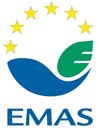
The EU Eco-Management and Audit Scheme (EMAS) is a management tool for companies and other organisations to evaluate, report and improve their environmental performance. The scheme has been available for participation by companies since 1995 (Council Regulation (EEC) No 1836/93 of 29 June 1993) and was originally restricted to companies in industrial sectors.
Since 2001 EMAS has been open to all economic sectors including public and private services (Regulation (EC) No 761/2001 of the European Parliament and of the Council of 19 March 2001). In addition, EMAS was strengthened by the integration of EN/ISO 14001 as the environmental management system required by EMAS; by adopting an attractive EMAS logo to signal EMAS registration to the outside world; and by considering more strongly indirect effects such as those related to financial services or administrative and planning decisions.
Participation is voluntary and extends to public or private organisations operating in the European Union and the European Economic Area (EEA) — Iceland, Liechtenstein, and Norway. An increasing number of candidate countries are also implementing the scheme in preparation for their accession to the EU.
The main stages of EMAS
To receive EMAS registration an organisation must comply with the following steps:
1. conduct an environmental review considering all environmental aspects of the organisation’s activities, products and services, methods to assess these, its legal and regulatory framework and existing environmental management practices and procedures.
2. in the light of the results of the review, establish an effective environmental management system aimed at achieving the organisation’s environmental policy defined by the top management. The management system needs to set responsibilities, objectives, means, operational procedures, training needs, monitoring and communication systems.
3. carry out an environmental audit assessing in particular the management system in place and conformity with the organisation’s policy and programme as well as compliance with relevant environmental regulatory requirements.
4. provide a statement of its environmental performance which lays down the results achieved against the environmental objectives and the future steps to be undertaken in order to continuously improve the organisation’s environmental performance.
The environmental review, EMS, audit procedure and the environmental statement must be approved by an accredited EMAS verifier and the validated statement needs to be sent to the EMAS Competent Body for registration and made publicly available before an organisation can use the EMAS logo.
Read more on EMAS registration
Benefits of EMAS
Environmental concerns, growing public pressure and regulatory measures are changing the way people do business around the world. Consumers and shareholders are increasingly demanding environmentally-friendly products and services that are delivered by socially responsible companies. It is becoming increasingly important for organisations to demonstrate that not only their philosophies but also their investment strategies and day-to-day operations are sustainable.
•quality environmental management due to the use of a highly developed scheme
•contribution to environmental risk management of the organisation
•resource savings and lower costs according to the organisation's needs
•reduction of financial burdens due to reactive management strategies such as remediation, cleanups and paying penalties for breach of legislation
•financial benefits through better control of operations
•incentive to eco-innovate production processes while environmental impacts are rising world-wide
•compliance check with environmental legislation by EMAS verifier
•learn from good examples of other companies and organisations
•new business opportunities in markets where green production processes are important
•added credibility and confidence with public authorities, other businesses and customers / citizens
•improved relations with the local community
•improved quality of workplaces, employee morale and incentive to team building
•marketplace advantage and improved company image by improving stakeholder relations
| Latest news | 05. January - Devin municipality in Bulgaria endorses local environmental Charter In the framework of the EMAS Easy MOVE-IT! project, 4 hotels in Devin (Bulgaria) - Ismena, Persenk, Orpheus, and Euridika, along with the municipality and the local Hunting and Fisherment Union will sign on January 13, 2012 the Charter for Sustainable SPA & Wellness destinations. |